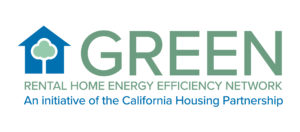The California Housing Partnership’s Sustainable Housing Team has been following policy updates closely, soliciting feedback from affordable housing providers, and advocating to ensure that the needs of low-income renters and the nonprofit affordable housing providers who serve them are prioritized in equitably implementing decarbonization policies at every level.
Furthering the Building Decarbonization Conversation
For nonprofit and government affordable housing providers interested in joining the Partnership’s GREEN Network, please contact our Sustainable Housing team.
PUBLICATIONS & BLOGS
- Report: March 18, 2022 | Affordable Housing Building Decarbonization Summit II Findings
- Blog: December 15, 2021 | Reaching Decarbonization Goals through the Electrification of Affordable Housing
- Blog: November 3, 2021 | New Program (CAMR) Provides Energy Burden Relief for Tenants in LA
- Op-ed: September 24, 2021 | Bridging the Gap Between Climate Justice and Housing Justice
- Report: April 1, 2021 | 5 Key Takeaways for Making Building Decarbonization Work in Affordable Housing (Summit I Findings)
- Blog: June 29, 2020 | The Pathway to New All-Electric Low Income Housing in CA
SUMMIT
With these eletrification initiatives becoming more widespread across the field, the Partnership began hosting an annual Affordable Housing Decarbonization Summit in 2020. Taking place in the fall, the summit convenes nonprofit affordable housing providers of our GREEN Network, government agencies, and other stakeholders to discuss the practical challenges and policy implications of electrifying affordable housing to green the state’s multifamily portfolio while meeting sustainability goals.
Background
In order to meet climate goals set by the state, cities across California have passed, or are considering efforts to pass, new local building energy codes aimed at decarbonizing new and existing buildings. These will have significant implications for the state’s multifamily affordable housing stock. State agencies such as the California Air Resources Board (CARB) and the California Energy Commission (CEC) are considering a range of zero-emission and electrification requirements that seek to phase out gas infrastructure and mandate renewable energy measures, such as rooftop solar in the coming years.
Under the most recent Title 24 standards, affordable housing funding programs such as the Low Income Housing Tax Credit (LIHTC) and Affordable Housing and Sustainable Communities (AHSC) programs have begun encouraging building electrification by allocating points on applications for all-electric developments. These policy trends indicate a shift by state and local leaders away from natural gas infrastructure toward renewable energy, and they also suggest that building decarbonization will be a requirement that affordable housing providers must contend with in the near future.

